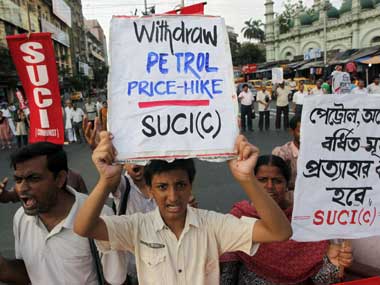After Goa cut state taxes on petrol and reduced the price of the fuel by Rs 11 per litre in late March, it’s the turn of the oil ministry to try something similar.
According to The Economic Times, the oil ministry has urged the finance ministry to cut taxes by Rs 6 per litre to prevent a sharp surge in the price of the fuel. Central government levies total Rs 14.78 per litre, including education cess, the newspaper noted.However, it’s highly unlikely the finance ministry will accept that request because it will, no doubt, lose revenues as a result.
 State-run oil companies have been warning for some time now that they need to hike petrol prices by up to at least Rs 8 per litre. In fact, they have wanted to hike petrol prices since March. While oil marketing companies are free to raise the price of petrol,which is a de-controlled product, in reality, they’ve been held back from doing so by the government over fears of a political backlash.
State-run oil companies have been warning for some time now that they need to hike petrol prices by up to at least Rs 8 per litre. In fact, they have wanted to hike petrol prices since March. While oil marketing companies are free to raise the price of petrol,which is a de-controlled product, in reality, they’ve been held back from doing so by the government over fears of a political backlash.
Worries of stringent political opposition has also kept a proposal to hike diesel prices in limbo.
A hike in diesel prices will affect the economy even more since it is widely used in transportation and fuel. On Wednesday, the government said it agreed, in principle, to make the prices of diesel market-determined . However, 24 hours later, it backtracked and said diesel de-regulation was not a ‘priority’, according to The Economic Times.
The wide difference between petrol and diesel prices, as well as fuel subsidies, are causing some unhealthy trends in consumption.As a nation, we’re guzzling so much of cheaper-priced diesel that we could be facing a shortage of the fuel by 2016, noted this _Firstpost_ story.
The growth is diesel demand is occurring even as oil marketing companies lose Rs 14.29 on every litre they sell because of the government’s policy of subsidising the fuel for users.
Heavy consumption of petroleum products is also keeping crude oil imports buoyant. As a Firstpost blog notes, “petroleum imports surged by 46.9 percent to $155.6 billion in 2011-12: This is the result of ruinous energy subsidies in India.”
And still, no change in sight.
)